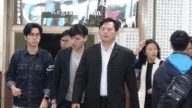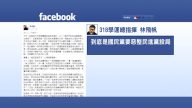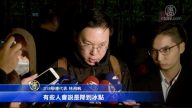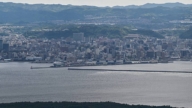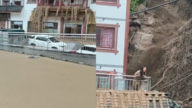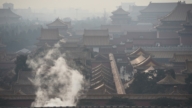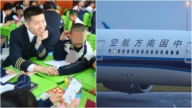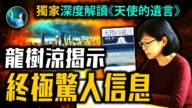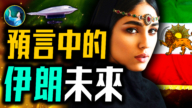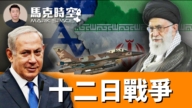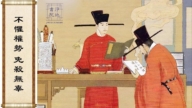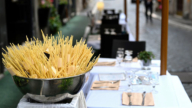【新唐人2014年03月25日讯】这几天世界媒体聚焦在台湾,因为台湾与大陆的《服务贸易协议》所引发的群众抗争,已连续几天,甚至24号因民众冲入行政院,被警方强制驱离,造成流血,现场警民对峙的照片传遍了全世界。为什么台湾民众誓死抵制《服贸协议》呢?专家为什么认为这个协议是“引狼入室”?请看详细报导。
24号上午,立法院联席会决议显示:上周国民党立委张庆忠所宣布的决议无效,服贸协议应退回行政院并重启谈判。
前一天,23号晚上,台湾“反服贸”学生突然冲入行政院。 24号凌晨,警方在驱赶学生的行动中,与抗议群众发生暴力冲突。凌晨4点半左右,警方使用了高压水柱驱散行政院周围聚集的民众。
台湾目前已经开放中资达7亿美元,《服贸协议》将再开放64项服务业,包含证券、银行、旅游、医疗社服,美容美发、营造业等。
民众从中总结出大陆开放的四项不平等条约,包括:跨境提供服务无限制、跨境消费无限制、商业据点呈现无限制,和自然人呈现无限制。
香港《开发》杂志编辑蔡咏梅以台湾《中国时报》为例说,随着大陆经济对台湾的渗透,台湾存在的基础都在遭到破坏。
蔡咏梅:“《中国时报》在日据时代,是个自由主义倾向很强的一份报纸,甚至在台湾戒严的时候,它都敢于讲话的。但是有一个台商买去,这个台商去中国大陆做生意,发展得非常好,现在这份报纸在新闻上完全是倒向北京,完全变成了中共的传声筒,对台湾的新闻自由打击很大。”
香港媒体人贾荃在《苹果日报》的网上也发表评论说,实际上,《服贸协议》最值得反对的,是根本没可能“对等”的部分。例如“印刷及其辅助服务业”,谁会相信大陆真的开放市场,让台湾的企业进入投资呢?最后的结局,无非是大陆书随意进入台湾,台湾书却要受到重重审查而已。
台湾青年反共救国团和台湾维吾尔之友会常务理事杨月清:“表面上看是经济的目地,实质上当然就是政治的目地。它大批的人来先抢了你的工作,占好了个位置,然后有能力的商人来。当然啰,这就是一个政治目地。”
去年6月21号,台湾和中共当局在上海签署了《两岸服务贸易协议》,这是台湾和北京签署的ECFA自由贸易协议的一部分。之后,台湾最高民意机构立法院要求审查这项协议内容,原本经各党协商,同意“逐条审查”条文。
但国民党立委张庆忠3月17号在内政委员会上,仅仅用了30秒,就以“ 《海峡两岸服贸协议》已超过3个月期限,依法视为已经审查”的理由,完成了所谓的审查。
蔡咏梅:“中国大陆现在就是一个极权国家,整个国家的经济命脉完全掌握在共产党一党专政、党的手中间,国有经济占有绝对的垄断地位,民营企业家从事经济活动就要官商勾结,只要你在中国大陆去赚人民币,你就不能发表任何政治异见。”
18号晚上9点多,在立法院外集结的几百名大学生冲进立法院议场,表示“服贸”通过审查,程序不公,学生代表要求与台湾高层对话。 随后,在26小时内,有1万多名大学学生和民众聚集在立法院外,表达支持。
蔡咏梅:“现在台湾经济上,对大陆的经济依赖得已经比较深了。如果它对台湾的经济有控制的时候,那整个台湾民主、人权、自主权最后都会丧失。这个是一个引狼入室的协议,把一个很敌对的、想控制你的势力,引入台湾。这个协议对台湾来讲,关系到台湾的生死。”
几天来有大量律师、作家、歌手、演员、和留学海外的台湾学生,声援这场“学运”。大陆“89六四学运”学生领袖王丹和吾尔开希也前往现场声援。“台湾青年反共救国团”和“台湾维吾尔之友会”常务理事杨月清和丈夫、以及台湾政论家林保华,也在立法院陪伴学生4个夜晚,24号凌晨才离开。
采访编辑/唐音 后制/钟元
Taiwan Police Clash with Protesters of New Deal with China
Conflict over Taiwan’s new service trade pact with China
has led to bloodshed when protesters rushed into Taiwan’s
executive building and were met with police resistance.
Photos of the violent scene have since spread around the world.
Why did the Taiwanese people resist the trade pact?
Some experts say the trade agreement is asking for trouble.
The following is our report.
On the morning of March 24, Taiwan’s legislature
announced the decision made last week
by legislator Chang Ching-chung as invalid.
The trade agreement had to be returned
to the Executive Yuan to be re-negotiated.
The day before, protesters broke into the Executive Yuan at night,
and by morning, conflict erupted between police and protestors.
At around 4:30 AM, the police began using water cannons to
disperse people gathered around the Executive Yuan.
Taiwan has opened it’s financial market to China
for up to $700 million.
The new trade pact will open another 64 Chinese
service industries to Taiwan, including securities,
banks, tourism, medical services, cosmetics, and
manufacturing.
Many Taiwanese are saying the trade pact includes
four unequal treaties: Unrestricted cross-border services,
unrestricted cross-border consumption,
unrestricted commercial presence,
and unrestricted natural person presentation.
Cai Yongmei, editor for Hong Kong based Open Magazine,
says Taiwan’s China Times is an example of the foundation of
Taiwan’s existence being damaged in the tide of economic
penetration from China.
Cai Yongmei: “China Times used to be a very strong liberal
newspaper during the Japanese colony era. Its daring was clear
even when Martial Law was imposed in Taiwan.
But, ever since it was bought by a Taiwanese businessman
who went to China to develop his business, the newspaper has
completely bent towards Beijing
and become a mouthpiece of the CCP.
This is a huge blow to Taiwan’s press freedom."
Hong Kong media professional Jia Quan commented in
the Apple Daily online, saying that the trade pact should be
opposed for doesn’t hold any fundamental equality.
Taking the print industry as an example,
he questioned whether China would have an open market
for Taiwan businesses to invest in print media.
He says books from China would
enter Taiwan freely, but Taiwan’s books
would be subject to layers of review and investigation.
Yang Yue-Ching, executive director of Taiwan Youth against
Communism and the Taiwan Friends of Uyghur organizations:
“On the surface, it looks like for the economy.
But, it is of course political in essence.
Large numbers of people will come to Taiwan to grab the jobs
and take good positions, followed by capable businessmen.
Of course it has a political purpose."
On June 21, 2013, Taiwan and CCP officials in Shanghai
signed the Cross-Strait Service Trade Agreement, as part of an
earlier free trade agreement between Taiwan and Beijing.
Taiwan’s Legislative Yuan demanded a review of the agreement.
Through negotiation among each party,
it was agreed to review the provisions article by article.
But in the legislative interior committee meeting on March 17,
KMT legislator Chang Ching-chung bypassed the review and
claimed the provision going to the second reading due to the
agreement has passed the three month deadline, and was
considered passed by law.
Cai Yongmei: “Mainland China is a totalitarian state.
The economic lifeline of the entire country rests in the CCP
and its one-party dictatorship.
The state-owned economy has an absolute monopoly, and the
private entrepreneurs have to collide with the officials to engage
in economic activities.
If you want to make money there,
you are not allowed to express any alienated political views."
At 9pm on March 18, several hundred protesters,
mostly college students, stormed into the Legislative Yuan,
saying the trade pact was passed without democratic procedure,
and demanding a dialogue with the government.
Within 26 hours, more than 10,000 people participated in the
protest outside of the Legislative Yuan to show their support.
Cai Yongmei: “Taiwan’s economy has a deeper dependence on
China’s economy.
When it is so deep that it actually controls Taiwan’s economy,
Taiwan will lose its entire democracy, human rights,
and autonomy.
This trade pact is a deal is like bringing a wolf into the house,
bringing an enemy and a controlling force into Taiwan.
This deal is a matter of life or death for Taiwan."
In the past few days, many lawyers, writers, singers, actors, and
Taiwanese students studying abroad paid their solidarity to the
student movement.
The 1989 Tiananmen student protest leaders Wang Dan and
Wuer Kaixi also went to the scene to show their solidarity.
Yang Yue-Ching, executive director of Taiwan Youth against
Communism and Taiwan Friends of Uyghur organizations,
and her husband, Taiwan politics commentator Lin Baohua,
also joined the protest with the students for four nights
until the early morning of March 24.
Interview & Edit/Tangyin Post-Production/Zhongyuan



